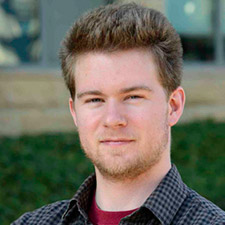
Social Networking Expert Joins Computer Science Faculty at UC San Diego
Published Date
By:
- Doug Ramsey
Share This:
Article Content

Julian McAuley
He is best known for having analyzed 42 million Internet product reviews consisting of over five billion words written by 10 million users, including every Amazon review posted through early 2013. In his exhaustive research, Julian McAuley sought to create a model for automatically analyzing opinions and behaviors in online communities. McAuley’s research with Stanford professor Jure Leskovec made it possible to predict product ratings more accurately, and the model earned the computer scientists a $5,000 grand prize in the inaugural Yelp Dataset Challenge.
“Our approach more accurately predicts product ratings by harnessing the information provided in the text of reviews,” said McAuley. “This is especially true for new products and users, who may have too few ratings to model their latent factors, yet may still provide substantial information from the text of even a single review.”
As a postdoctoral researcher at Stanford University, McAuley works in the very heart of Silicon Valley. Now the born-and-bred Australian is migrating south to another tech mecca. By the fall quarter, he will join the Computer Science and Engineering (CSE) department at the University of California, San Diego. McAuley will become a CSE assistant professor in UC San Diego’s Jacobs School of Engineering, and he does so at a time when the convergence of information technology and wireless communications are blurring the lines between Silicon Valley and San Diego’s wireless hub.
“This is an exciting time for a researcher who wants to explore social networks, and I expect that my location and mobility will have a very tangible effect on the scope of my research,” said McAuley.
“Julian McAuley has driven an exciting research agenda in understanding the structure and dynamics of social networks,” said CSE Chair Rajesh Gupta in announcing the appointment. “He will allow the department to build a research group in the growth area of social networks.”
In his more recent research, McAuley has focused on the linguistic and temporal dimensions of opinions and behavior in social networks and other online communities. “The proliferation of user-generated content on the web provides a wealth of opportunity to study humans through their online traces,” said McAuley in a public seminar this spring at UC San Diego, adding that his research requires “models that are capable of handling high-dimensional, interdependent and time-evolving data in order to gain insights into how humans behave.”
The April 14 webcast of McAuley’s CSE Faculty Candidate Public Seminar on “Machine Learning for Social Systems: Modeling Opinions, Activities and Interactions,” is available for viewing on-demand from the CSE video archive.
McAuley earned his Ph.D. in computer science from the Australian National University in 2011. His doctoral work was on graphical models for inference and learning in computer vision. In 2010 he interned for three months in Google’s group responsible for its docs platform, and the previous year he did an internship at Xerox Research Center Europe to study applications of machine learning to image classification and segmentation. McAuley did his undergraduate work at the University of New South Wales, earning degrees in software engineering and pure mathematics.
At Stanford, McAuley currently works in Stanford’s Infolab on modeling the structure and dynamics of social networks. His research has been equal parts social networks, data mining, and machine learning. McAuley’s projects and findings have won him followers and media attention even beyond the realm of academic journals and trade publications. In 2013, his paper, “From Amateurs to Connoisseurs”, was featured as far afield as a CBS radio station, Business Insider, and the Beer Street Journal. (Why beer? Explained McAuley: “We studied over 10 million reviews where users have ‘acquired tastes’ for products such as beers, wines, gourmet foods and even movies. This allowed us to study how consumers gain expertise as they rate and review products.”)
McAuley, Leskovec and Stanford graduate student Himabindu Lakkaraju also attracted media attention with the results of their research into what makes an item popular on social media. They limited their study to Reddit and to so-called resubmissions, i.e., content that has been submitted multiple times, with multiple titles, to multiple different communities. “We developed models to disentangle how much of the popularity of a post is due to quality of the content versus having a good title, posting it at the right time, or to the right community,” said McAuley. “We also developed language models that explain how the success of each submission was influenced by its title.” Time magazine titled its article on the research, “How to succeed on reddit,” Forbes explained “How to craft the perfect reddit posting,” and New Scientist wrote simply, “Things that make a meme explode.”
Share This:
You May Also Like
Stay in the Know
Keep up with all the latest from UC San Diego. Subscribe to the newsletter today.


